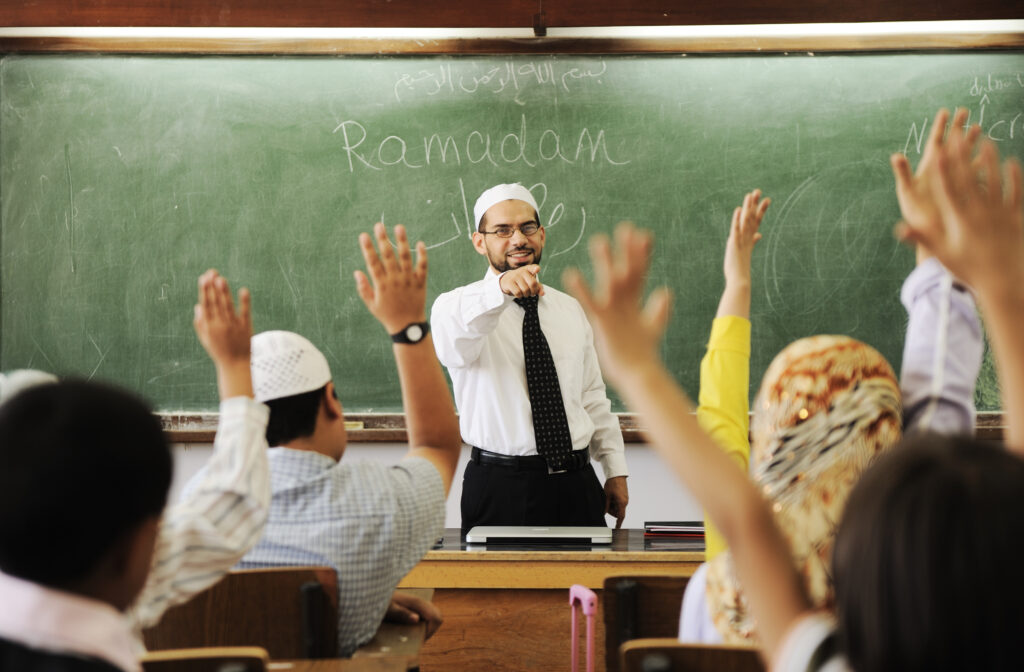Survey asks administrators to consider: Are we ready?

By Shaza Khan
September/October 2022
The Covid-19 pandemic shook many educators to their core. Unexpectedly, within a matter of weeks, U.S. school leaders went from hearing about a new “possible” pandemic to having an actual pandemic close school doors for up to two years in some instances.
According to research conducted by the Islamic Schools League of America (ISLA), Islamic schools responded remarkably well to the many pandemic-related challenges. From constantly (re)-adjusting instructional methodologies (from distance learning to hybrid to remote to in-person) to obeying local health and safety ordinances, making sense of the Centers for Disease Control’s shifting guidance and altering certain aspects of the Friday congregational prayers and Ramadan — Islamic faculty proved to be very agile and successful when it came to educating their students.
Not-So-New Crises (Re)-Emerge
Given the seemingly all-consuming focus on obstructing Covid-19’s spread, the time, energy and attention usually given to other crises may have taken a back seat. The May 24 school shooting in Uvalde, Tex. — 19 students and two other individuals killed — brings to light the unfortunate reality that school administrators must remain aware that other crises can occur on school premises.
Dr. Leila Shatara (head of school, Noor-Ul-Iman School; president, Council of Islamic Schools in North America [CISNA]) wrote on May 25, 2022, in an email listserv, “I’m just numb. I don’t know how to process this as a school leader responsible for the safety of hundreds of children. We have spent the past three years in constant concern for their health and well-being and now are reminded of the insanity that occurs in the U.S with these school shootings.”
Crisis Management
Islamic schools operate in a unique environment. As private nonprofit institutions, they are not bound to the same legal and institutional requirements as public schools. Therefore, our schools don’t always have knowledge of and access to crisis prevention and response strategies that may be found in public schools.
However, Islamic schools are equally susceptible to such crisis situations as school shootings, suicide attempts and medical emergencies. Other crises may include natural disasters, bomb threats, mass allergic reactions, severe weather, medical emergencies, riots and demonstrations, fires, student or staff deaths, explosions, chemical/hazard spills, acts of terror or war, flooding, bus crashes, outbreaks of disease, hostage situations, school shootings, domestic violence threats, kidnapping assaults and/or fighting, power/IT outages, missing students, suicide attempts and weapons incidents.
While every crisis situation is distinct, the ones listed above fall within the purview of a school’s crisis management toolkit. ISLA recently received a Community Response Initiative grant from Islamic Relief USA (IRUSA) to provide a Crisis Response Toolkit for Islamic schools. As a preliminary step to creating it, ISLA conducted a survey to better understand Islamic school administrators’ perspectives on their schools’ preparedness and response to crisis situations, including violent/armed intruders.
Survey
School leaders were asked to respond to the following questions:
1. How concerned are you about a violent/armed intruder at your school?
2. How prepared is your school against a violent/armed intruder?
3. Does your school have a communication plan in the case of a local or national crisis?
4. Does your school have a crisis management plan?
5. Which agencies do you have school-community partnerships with? [police, fire department, other]
6. Which of the following drills has your school run with students during the 21-22 academic year? [fire, armed intruder, severe weather, lockdown, other]
7. Which of the following crisis scenarios are your top three concerns for your Islamic school community? [gun violence, terrorist attack, student/staff death, natural disaster, fire, hostage situation, chemical/hazard spill, bus/vehicle crash, missing student, power/IT outage, medical emergency, student physical altercation, cybersecurity threat/ hack, domestic violence/threats]
8. Which would be most beneficial to help you prepare for a crisis situation at your school? (Select all that apply). [informational webinar for admin on types of crises, training videos to help staff respond to crises; Islamic School Crisis Manual for admin and staff, funding to hire consultants/staff to manage or prepare for crises, differentiated training for different stakeholders (staff, parents, students), risk management training, access to curated community resources]
9. Are there any other thoughts, concerns or ideas you would like to share about gun violence and/or crisis response at Islamic schools?
Although the survey administration was incomplete when this article was published, responses were received from 63 administrators representing 58 Islamic schools across the U.S. (N=55) and Canada (N=4). Most respondents (78%, N=50) were school principals or head of school; others were operations managers, vice principals and directors of a subdivision of the school (i.e., elementary).
Based on their responses, 48% were “very concerned” or “concerned” (N=31) about an armed intruder in their school; 28% were “unsure or neutral” (N=18). Interestingly, nearly 40% were unsure of how prepared their school was if this scenario were to occur (N=25).
A total of 31% (N=20) of the administrators “agreed” (N=14) or “strongly agreed” (N=6) that their school was prepared against an armed intruder. Of those who strongly agreed, five indicated that their school had a crisis management plan. All had relationships with the local police and fire departments and had engaged students and staff in a lockdown drill, among other crisis response drills, during the past academic year.
Most Islamic schools also reported that they had a communication plan to deal with a local or national crisis (63%, N=40). Slightly more indicated that they had a crisis management plan (70%, N=45).
Islamic schools reported partnerships with a wide range of agencies, and nearly all administrators reported that their school had a partnership with the local police (94%, N=60) and fire departments (64%, N=41) — two key agencies identified as crucial school-community partnerships for crisis preparedness.
Crisis response drills are another preventative factor that the majority of Islamic schools enacted during the past academic year. The most common drills are those associated with fire (97%, N=62), school lockdown (67%, N=43) and severe weather (55%, N=35).
Most Islamic school administrators — 56% of respondents (N=36) — identified gun violence as the top crisis scenario. The other two top scenarios were medical emergencies (39%, N= 25) and missing students (30%, N=19).
Developing a Toolkit
The survey’s last aspect asked the administrators to tell ISLA what they needed to be better prepared for and more responsive to a crisis situation. Specifically, they were asked to identify the top three most beneficial resources in this regard. Respondents selected training videos for staff on how to respond (70%, N=45), an Islamic School Crisis Manual for administrators and staff (63%, N=40) and, finally, customizable templates for them to use in the event of an emergency (42%, N=27).
Recognizing the urgent need for crisis response prevention, response and training, ISLA will use this survey’s data, as well as focus group interviews with the participating administrators, to produce a Crisis Response Toolkit for Islamic school administrators and staff. This toolkit will be funded by the $10,000 Islamic Relief Community Response Initiative Grant recently awarded to ISLA. The project, which is expected to be completed within the next six months, will include research on crisis management in schools, expert consultants, resource curation and development, as well as training for Islamic school staff.
Shaza Khan, Ph.D., is executive director of the Islamic Schools League of America.
Tell us what you thought by joining our Facebook community. You can also send comments and story pitches to horizons@isna.net. Islamic Horizons does not publish unsolicited material.
